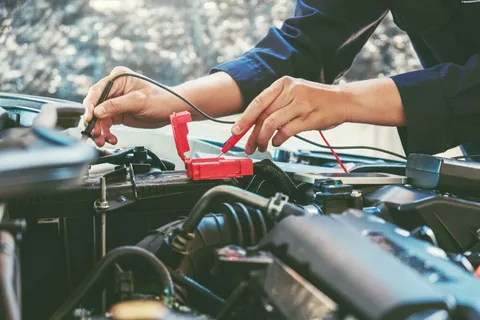A Comprehensive Guide to Auto Car Electrical Repair
In 2025, cars are more reliant on electrical systems than ever before. From advanced infotainment to safety features and electric vehicle (EV) components, the role of auto electronics has grown exponentially. As a result, auto car electrical repair has become one of the most important aspects of vehicle maintenance. But what exactly does it involve? Who should you trust to handle it? And how can you tell if your vehicle has electrical issues?
This guide answers all those questions—and more—with clarity, depth, and credibility. Whether you’re a car owner, enthusiast, or someone experiencing unexplained car issues, understanding auto electrical systems can help you stay safe and save money.
What Is Auto Car Electrical Repair?
Auto car electrical repair refers to the diagnosis, maintenance, and repair of a vehicle’s electrical systems. This includes everything from your car battery and alternator to sensors, wiring, and onboard computers.
Key Electrical Components in Modern Cars
- Battery – Provides initial power to start the engine and supports electronics when the engine is off.
- Alternator – Charges the battery and powers the vehicle’s electrical system while running.
- Starter Motor – Cranks the engine when starting the car.
- ECU (Engine Control Unit) – The computer that manages engine performance and other subsystems.
- Fuses & Relays – Protect electrical circuits and regulate power flow.
- Wiring Harness – Network of wires delivering power to various parts.
- Sensors & Actuators – Provide data and control systems like ABS, airbags, and fuel injection.
As vehicles continue to evolve—especially with the rise of EVs and hybrids—the complexity of these systems demands qualified diagnostics and repairs.
Common Signs of Electrical Problems
Recognizing early signs of electrical failure can prevent more costly damage. Look out for:
- Dim or flickering headlights
- Difficulty starting the vehicle
- Frequent fuse blowouts
- Malfunctioning dashboard lights
- Battery dying too quickly
- Burning plastic smell
- Unresponsive power windows, locks, or seats
If you experience any of these issues, it’s time to schedule a professional inspection.
Diagnostics: How Professionals Identify the Issue
Professional auto electricians use advanced diagnostic tools such as:
- OBD-II scanners (On-Board Diagnostics)
- Multimeters to check voltage, resistance, and continuity
- Oscilloscopes to analyze waveform patterns in electrical signals
- Thermal imaging cameras to detect heat buildup or short circuits
These tools help technicians pinpoint the issue accurately, saving time and reducing the risk of unnecessary repairs.
E-A-T Tip: According to the Automotive Service Association (ASA), only certified technicians should perform complex diagnostics on modern vehicles to maintain system integrity and ensure road safety.
Why You Should Choose a Certified Auto Electrician
Not all mechanics specialize in electrical systems. Given the high stakes—such as your car not starting or safety systems failing—choosing a certified auto electrician is critical.
What to Look For in an Auto Electrical Specialist
- ASE Certification (Automotive Service Excellence)
- Up-to-date diagnostic equipment
- Experience with your vehicle’s make and model
- Transparent pricing and service explanations
- Positive reviews and customer testimonials
Choosing the right expert not only ensures accurate repairs but also protects your warranty and enhances your car’s lifespan.
DIY vs. Professional Repair: What’s Best?
While it might be tempting to replace a fuse or battery yourself, modern car electrical systems are incredibly intricate. Incorrect DIY repairs can lead to further damage or void your warranty.
Safe DIY Tasks:
- Replacing headlight bulbs
- Swapping out a car battery (if you follow manufacturer guidelines)
- Changing interior light bulbs
Tasks to Leave to Professionals:
- Rewiring systems
- ECU diagnostics and programming
- Alternator or starter replacement
- Diagnosing parasitic battery drains
In short, if you’re unsure, consult a professional. Attempting to fix complex issues without the right tools or expertise can lead to costly consequences.
The Rise of EVs and Their Unique Electrical Needs
As of 2025, electric vehicles represent a growing share of body auto repair shop on the road. Unlike internal combustion engines (ICE), EVs are entirely dependent on electrical systems for propulsion, making auto electrical repair even more essential.
Unique Electrical Aspects of EVs:
- High-voltage batteries
- Electric motor controllers
- Inverters and converters
- Regenerative braking systems
- Advanced software diagnostics
EV repairs require specialized tools and knowledge. Always seek technicians trained in EV systems to ensure safety and compliance with industry standards.
Authoritative Insight: The now offers EV Certification, a sign that a technician has the training needed to work safely on electric vehicles.
Preventive Tips: Keeping Your Car’s Electrical System Healthy
Preventive maintenance can reduce the risk of electrical issues and prolong the life of your vehicle.
Top Tips:
- Inspect the battery regularly for corrosion or leaks.
- Test battery voltage annually.
- Replace old fuses with the correct amp rating.
- Check your alternator output during routine servicing.
- Avoid DIY wiring mods that could create short circuits.
- Use a trickle charger if the car sits idle for long periods.
Regular checkups at a trusted service center can catch small issues before they become major repairs.
How to Choose the Right Repair Shop
Not all repair shops are equal. Here’s a checklist for finding a reliable auto electrical repair service:
- ✅ Certified by ASE or equivalent
- ✅ Specializes in electrical systems
- ✅ Offers a diagnostic report
- ✅ Uses original or high-quality replacement parts
- ✅ Provides a warranty on labor and parts
- ✅ Transparent communication and cost estimates
Ask questions like:
- “Do you have experience with my vehicle’s brand?”
- “What’s your warranty policy?”
- “Do you use OEM or aftermarket parts?”
Your car is a significant investment—ensure it’s in the hands of professionals who value quality and transparency.
The Cost of Auto Electrical Repairs
Auto electrical repair costs vary based on the type of issue, vehicle make/model, and labor rates in your area.
| Repair Type | Estimated Cost (USD) |
|---|---|
| Battery replacement | $100 – $300 |
| Alternator repair | $300 – $800 |
| Starter motor replacement | $400 – $600 |
| ECU diagnostics | $100 – $200 |
| Wiring repair | $150 – $1,000+ |
While prices can vary, always opt for quality service over cheap fixes, which can often lead to recurring issues.
Final Thoughts
In the age of smart vehicles, auto electrical repair is no longer a luxury—it’s a necessity. Whether you’re dealing with a faulty sensor or a dying battery, seeking timely, professional service can save you from dangerous breakdowns and expensive repairs.
Takeaway Tips:
- Don’t ignore signs of electrical trouble.
- Choose certified and experienced technicians.
- Schedule regular preventive maintenance.
- Avoid DIY fixes for complex issues.
- Stay informed and ask the right questions.
By understanding the importance of auto electrical systems and how to care for them, you empower yourself to make better, safer, and more cost-effective vehicle decisions.













